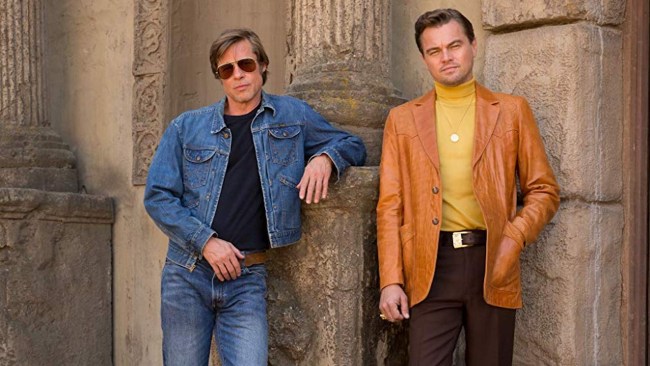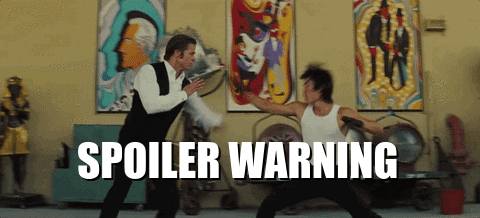
Columbia Pictures
Arguably the most anticipated film of the year, Quentin Tarantino’s ninth feature, Once Upon A Time In Hollywood, has finally made its way into the pop-cultural zeitgeist, and with it comes the typical discussion that disseminates in the wake of all of the legendary director’s outputs.
Warning: major spoilers for ONCE UPON A TIME IN HOLLYWOOD will follow.

Despite being a director who’s quite literally internationally known for his gratuitous use of violence, Tarantino still finds ways to surprise the audience with the way said gore is deployed, a trend that more than continues with Once Upon A Time In Hollywood.
Yet, on the grand scale of Quentin Tarantino films, Once Upon A Time In Hollywood — you know, a movie that features the Manson Family — actually ranks as one of his least violent. That is, of course, until the ending.
In a movie that’s straightforward to a fault, Tarantino saves his trademark big twist for the film’s final act, as the Manson Family members dispatched to murder Sharon Tate and company never actually make it to the Polanski house at all, instead choosing to unleash their sadistic wrath on the home of Rick Dalton (Leonardo DiCaprio).
Only problem is, they instead find themselves face to face with his comically well-trained stunt double Cliff Booth (an entire previous scene that shows Booth giving Bruce fucking Lee the business is used to reiterate just how dangerous Booth is).
What ensues, the climax of the film, is also the movie’s most entertaining moment, as Booth — who’s tripping on acid following an LSD-dipped cigarette — overtakes Manson’s three goons with his supremely-honed combat skills and the help of his trusty pit bull Brandy.
The result is 10-straight minutes of dog-chomping, curb-stomping, face-smashing, flame-throwing madness that’s largely played to deftly comedic effect. And frankly, to Tarantino’s credit, it’s a twist you never really see coming despite how obvious the outcome appears to be in hindsight.
While the moment ultimately works, the question becomes: “Was it all worth it?” And the answer is, unfortunately, no.
Throughout his iconic career, Tarantino has been known for crafting perfectly-paced and creatively-structured narratives, which are features that Once Upon A Time In Hollywood painfully lack.
One of Tarantino’s few films to unfold linearly, Once Upon has no semblance of a discernible plot as there is quite literally nothing driving the story forward in the film’s first two acts, which largely serve as a window into Rick and Cliff’s lives in 1969 Los Angeles.
While cruising around dreamlike late 60s California with characters as entertaining and immersive as Dalton and Booth is no hard labor, it’s also aggressively subversive to the usual wound-tight plotlines that we’ve come to expect from Tarantino films.
Yes, Once Upon A Time In Hollywood‘s final 30 minutes plays like a classic Tarantino flick, but the prior two hours of aimless meandering render the film’s bloody conclusion as nothing more than an admittedly sweet cherry on top of a decidedly average, yet still wholly enjoyable, sundae.
After all, ice cream is ice cream and that’s exactly what Tarantino has delivered here. It just may not be everyone’s favorite flavor.